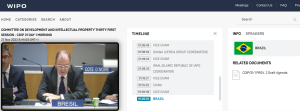On Monday, 27 November 2023, Brazil delivered the following general statement at WIPO’s Thirty-First Session of the Committee on Development and Intellectual Property. The statement was delivered by Ambassador Guilherme Patriota, one of the architects of WIPO’s Development Agenda.

General Statement by Brazil at the Thirty-First Session of the Committee on Development and Intellectual Property, November 27, 2023.
• Thank you Madam Vice-Chair.
• And I thank DG Daren Tang, DDG Hasam Kleib and the CDIP WIPO team for supporting this session and this Committee.
• The development agenda is an opportunity for WIPO to improve its credentials as a member of the UN family, by adjusting its intellectual property mandate to effectively help member states, especially developing member states and LDCs, to achieve their development goals.
• As we all know, but with time may start to forget, the development agenda for WIPO was meant to produce a change in culture and in the modus operandi of an organization to often more concerned with protecting the interest of rights holders, especially large multinational corporations, instead of making the IP system work for individual creators and innovators and for society.
• The central element of the development agenda was and still is the norm-setting one, not technical assistance and cooperation, though important these may be.
• Projects on the agenda of the CDIP are positive overall and have been elaborated respecting the member-driven and needs-based own assessments of interested member states. These are the guidelines established by the 2007 agreement that created this standing committee, and we must make sure we continue to abide by them.
• Secretariat cooperation and engagement, one must conclude, fully aligns with the neutrality that was emphatically required of it by the development agenda decision and its recommendations. Such neutrality requirement, of course, was made explicit in 2007 for a reason, and basically because the record for the organization was not the best in this regard.
• There were innumerous instances in the past when developing countries were guided towards unbalanced IP enhancing processes that did not fully take into consideration their respective levels of development and capacities. Nor the flagrant asymmetries between their national capacity to generate protectable innovation or creativity and those of developed members and their global corporations.
• The delegation of Brazil wishes to recognize that circumstances have changed 16 years after the creation of CDIP, now under the leadership of DG Daren Tang, who is clearly more amenable to a multidimensional and holistic and approach to WIPO’s activities. And we commend him for that.
• Times have also changed. We now have the COVID-19 pandemic in hindsight to remind us of the importance of a public interest approach to intellectual property, and that we must focus on people’s health and lives as the overriding priority. It took a tragedy of global proportions for the IP system to move an inch towards a better public-interest private-profits balance in vaccines, as the TRIPS Waiver under the MC12 mandate of the WTO demonstrated. We now lack the subsequent step of extending the waiver to therapeutics and diagnostics. It was meant to be ready by the end of this year. But we are nowhere near such an outcome.
• A climate crisis is looming, and nations are preparing to make good on their UNFCCC and Paris Agreement nationally determined contributions. Green industrial and energy transitions are on the way or being planned. Sustainable agriculture, biodiversity protection, clean water and sanitation, keeping the seas and their natural resources sustainable, cutting down carbon emissions, promoting sustainable patterns of consumption, protecting forests and dealing with AI are objectives that have acquired renewed urgency. They call for access to sustainability related technologies, most of it protected by IP, and therefore not widely or readily accessible where most needed, or simply unaffordable because of the strong monopoly rights that lock them in. Much technology, by the way, has been produced with the help of public money lavishly provided by Governments in advanced economies to accelerate R&D in these critical sectors. Such new industrial subsidies are in the order of trillions, not billions, mostly out of taxpayer’s money. The ensuing technology must not all be privately or indefinitely appropriated through IP instruments without due consideration of their public-interest value and relevance for sustainable development.
• The main message from my delegation, therefore, is that health, sustainability, food security and climate related IP should be balanced towards assisting us with our common development goals within the framework of the 2030 Agenda for Development, and beyond. This should be discussed by members of CDIP, with appropriate development-oriented inputs from WIPO and other relevant agencies of the UN, academia, and NGOs. And it should be practical so that members from developing countries are better placed to engage in IP related norm-setting exercises, within the WIPO framework or in other venues. Such as in the elaboration of the WHO Pandemic Treaty, the climate-change related COP negotiations, or the WTO discussions on the TRIPS Waiver extension or on e-commerce.
• Speaking of the digital sphere, it is Brazil’s view that CDIP must also contribute to a more development-oriented approach to normative discussions in the SCCR related to the rights of authors, musicians, creators, and performers. Their rights are being encroached upon by dominant digital platforms. Because of their overwhelming accumulated power, income and creativity are being sapped in many parts of the developing world where audio, literary and video creations have developed as unique expressions of diverse national and local cultures. Brazil is interested in protecting the rights of individual musicians and creators in this new world of streaming and looks to the CDIP to engage in specific projects, studies and normative work to deal with the challenges posed by digital platforms and streaming services to individual creators and performers.
Thank you.